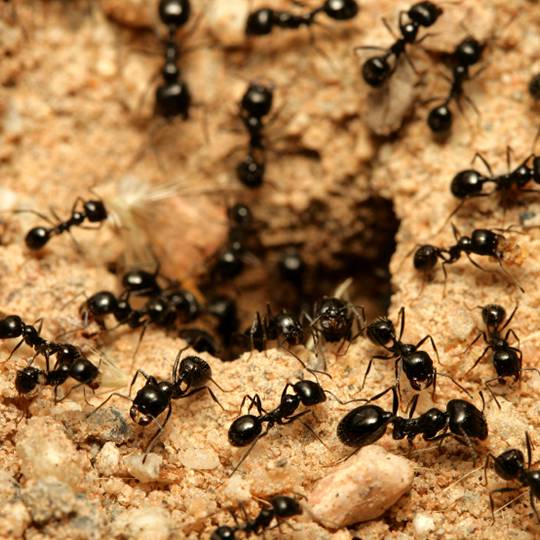
Ants are everywhere. For every human on earth, there are about a million tiny ants. Ants (formicidae) are highly social creatures that live in colonies ranging from a few dozen to millions of insects. The colony is made up of three types of ants: the queen, the female workers, and males. While the queen and male ants have wings, we typically see the wingless, female worker ants parading in a line down a tree, sidewalk, and sometimes your walls.
The life cycle of an ant consists of four stages: egg, larvae, pupae, and adult. The entire life cycle can take several weeks to several months to complete. Males live only a short time, while the females live much longer, and queens can live for many years.
Ants are brown or black, depending on the species, and have three segmented body parts. They may look tiny, but the tough exoskeleton of an ant can withstand floods and attacks, and they can carry loads many times their own body weight.
Ants are some of the most common insect invaders in the United States. When they’re looking for shelter, food, and water, they’re not picky about where to find it. They’ll search through houses, restaurants, warehouses, and other buildings through any crack or crevice they can find. They’re not picky about food, but they’re particularly drawn to sweets. An ant infestation is not only undesirable—no one wants to share food with ants—but it can also be unpleasant when they start to sting or damage indoor structures.
Ant Signs and Symptoms
You may see a few ants scatter across your kitchen counter before you notice them on parade in your pantry. The larger they are, the bigger your problem. If the ants are reddish-black in color, you could have carpenter ants who are out to chew through the wood in your home.
Ant nests can be difficult to locate. Look for small piles of soil or wood shavings to find where carpenter ants have been. They prefer dark, quiet corners or the insides of walls. You’ll be able to hear them rustling around behind the wall. When you knock on the wood you think they could be nesting in, you will hear a hollow sound.
Ant Prevention
Locating and destroying an ant colony is the most direct and effective way to control an ant infestation. Your own defense strategy will depend on the type of infestation you have. If you think it could be carpenter ants, the faster you find and destroy the nest, the less damage you’ll need to worry about.
Indoor Ant Protection
- Keep ants out by sealing any cracks and crevices leading indoors.
- Spray insecticide near entry points to your home.
- Keep your floors clean—ants won’t be attracted by food, and they may not be able to find their way back to their colony if you clean up the trail.
- Set bait traps. Worker ants will carry the toxic material from the traps back to the nest, eliminating the colony. Place the traps where there are ants, but where pets and children cannot reach the poisonous bait.
- Try to follow a line of ants back to their nest—most likely in a damp area such as attics, bathrooms, and exterior walls. Spray the nest with insecticide.
Outdoor Ant Protection
- Spot treat anthills and other infestations around outdoor areas with insecticide.
- Use a lawn and garden insect killer that contains bifenthrin as the active ingredient for larger areas. This spray will kill other insects, too.
- Trim back bushes, shrubs, and trees that touch your siding or roof to prevent ants from using these plants as a bridge to the inside of your house.
- The soil around the foundation of your home should slope down and away from the house.
- Avoid stacking firewood next to the house, since this is where ants could be hiding.
- Maintain a healthy lawn, since ants tend to colonize in bare spots and thatch.
If you have trouble finding an ant nest, enlist the help of professionals. They’ll know what to look for and how best to deal with the problem. Contact Cardinal Lawns to learn more about how to prevent or treat an ant infestation.
Need Help with Ants?
Call Cardinal Lawns today at 614-808-4446 and let's talk about how we can help treat for Ants and other common Ohio lawn pests.
Get a Free Quote